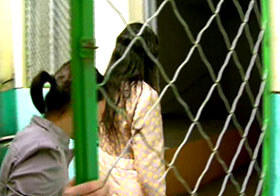Rights group exposes China's "black jails"
 Beijing - China is subjecting petitioners and rights activists to serious abuses in a network of illegal "black jails" in Beijing and other major cities, New York-based Human Rights Watch said Thursday.
Beijing - China is subjecting petitioners and rights activists to serious abuses in a network of illegal "black jails" in Beijing and other major cities, New York-based Human Rights Watch said Thursday.
"Since 2003, large numbers of Chinese citizens have been held incommunicado for days or months in secret, unlawful detention facilities known as 'black jails' by state agents who violate detainees' rights with impunity," the group said as it released a new report on China's use of the illegal detention centres.
"China has laws that set out how arrests and detentions should take place, but the government is blatantly ignoring those in the cases of black jails and those detained in them," Sophie Richardson, the Asia advocacy director of Human Rights Watch, said in a statement.
"A failure to live up to its own legal standards - let alone international standards - is not the hallmark of a government aspiring to global respect," Richardson said.
The black jails are also known as "holding centres," where petitioners, rights activists, members of illegal religious groups and sometimes criminal suspects are held pending their transfer to other facilities.
One of Beijing's main black jails is a collection of low-rise buildings, some of which look like old workshops, in the outlying southern district of Majialou.
The Majialou centre bears the official name of the Beijing Financial Assistance Management Centre. Its brick walls topped with metal spikes and barbed wire are the main external clue to its true function.
It is the last place that many petitioners see in Beijing, as most leave Majialou in the custody of police from their home areas, where they will sometimes face fines, beatings, harassment, and even detention at labour centres or prisons.
Zhang Xiuyun, a petitioner from the north-eastern province of Jilin, said police took her to Majialou after detaining her near Beijing's Tiananmen Square in January.
"The police searched my bag. When they saw that I had some petitioning documents they took me to the Tiananmen police station," Zhang told the German Press Agency dpa recently.
Zhang's friend from Jilin, Wang Xiuwang, said police had taken her to Majialou five times as she repeatedly tried to petition authorities in Beijing over her housing dispute.
"They have rooms for each province where you wait for local police to collect you," Wang said of Majialou.
"If you don't go (home), they beat you," she told dpa.
Wang said the rooms at Majialou were cramped and contained no beds, with only stools to sit on even for overnight detention.
Zhang said she and Wang were detained in Beijing again in late October and sent to a smaller black jail at a hostel run by officials from their province.
"The existence of black jails in the heart of Beijing makes a mockery of the Chinese government's rhetoric on improving human rights and respecting the rule of law," Richardson said.
"The government should move swiftly to close these facilities, investigate those running them, and provide assistance to those abused in them," she said.
The Human Rights Watch report said illegal jails were sometimes also located at nursing homes and psychiatric hospitals.
Former detainees interviewed by the group said guards routinely subjected them to "abuses including physical violence, theft, extortion, threats, intimidation, and deprivation of food, sleep, and medical care."
A 15-year-old girl told the group that she was seized by police in Beijing while she was petitioning on behalf of her disabled father, who had been detained at a nursing home in her home province of Gansu for two months and "subjected to severe beatings." (dpa)